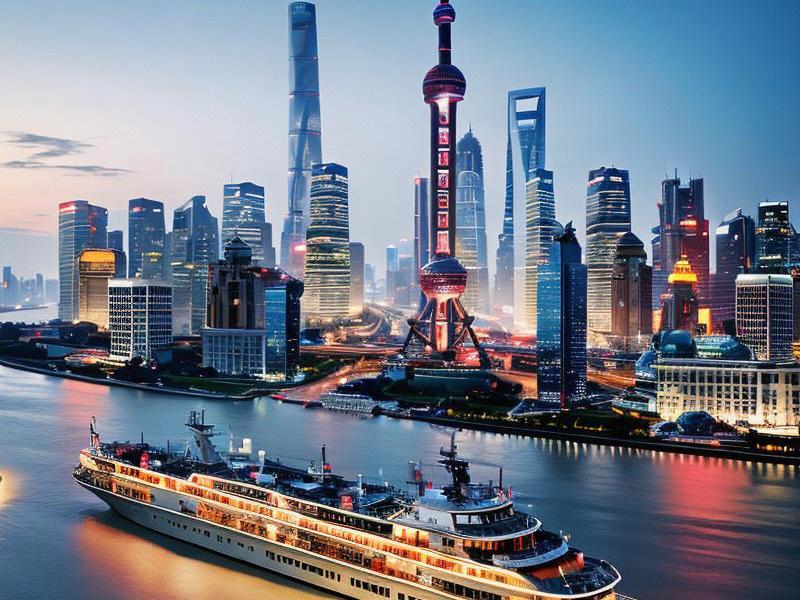This article delves into the remarkable transformation of Shanghai from a traditional port city to a leading global innovation hub. It explores the city's strategic initiatives, technological advancements, and urban development that have positioned it as a beacon of progress in China and beyond.

Shanghai, the bustling metropolis on the banks of the Huangpu River, has long been a symbol of China's economic prowess. Over the past few decades, this vibrant city has undergone a profound metamorphosis, evolving from a manufacturing powerhouse to a global hub for innovation, technology, and urban development. Today, Shanghai stands as a testament to China's ambition to lead the world in innovation and sustainable urbanization.
The journey of Shanghai towards becoming a global innovation hub is nothing short of extraordinary. It began in the late 20th century when the Chinese government identified the city as a key player in its economic reform and opening-up strategy. This strategic decision laid the foundation for Shanghai's rapid development, as the city embraced market-oriented reforms and attracted foreign investment.
One of the pivotal moments in Shanghai's transformation was the establishment of the Pudong New Area in 1990. This ambitious project aimed to crteeaa modern financial and trade center that would rival international counterparts such as New York's Wall Street and London's Canary Wharf. Today, Pudong is a symbol of Shanghai's success, housing some of the world's tallest skyscrapers, including the iconic Oriental Pearl Tower and the Shanghai Tower.
The city's commitment to innovation is evident in its thriving technology sector. Shanghai has become a magnet for tech companies, startups, and research institutions, fostering a dynamic ecosystem that drives technological advancements. The city's tech parks, such as Zhangjiang Hi-Tech Park and漕河泾新兴技术开发区 (Chuancheng New Technology Development Zone), have become incubators for cutting-edge innovations in fields like artificial intelligence, biotechnology, and information technology.
上海龙凤419官网 Artificial intelligence (AI) is one area where Shanghai has made significant strides. The city has established itself as a leader in AI research and development, with numerous universities, research institutes, and enterprises investing heavily in this field. For instance, 上海交通大学 (Shanghai Jiao Tong University) has developed advanced AI algorithms that are being applied in various industries, from healthcare to finance. Similarly, companies like 依图科技 (Yitu Technology) have gained international recognition for their AI-driven solutions.
Biotechnology is another sector that has seen remarkable growth in Shanghai. The city's biotech companies are at the forefront of developing innovative therapies and medical devices, contributing to the global fight against diseases. 上海张江生物医药基地 (Shanghai Zhangjiang Biopharmaceutical Base) is a major hub for biotech research and development, attracting top talent and investment from around the world.
Information technology (IT) is also a key driver of Shanghai's innovation ecosystem. The city is home to numerous IT companies that are leveraging big data, cloud computing, and the Internet of Things (IoT) to transform industries and improve people's lives. For example, 上海华为技术有限公司 (Huawei Technologies Co., Ltd. Shanghai Branch) is at the cutting edge of 5G technology, enabling faster and more reliable connectivity for businesses and consumers alike.
In addition to its thriving technology sector, Shanghai has also made significant strides in urban development. The city has implemented innovative solutions to address challenges such as traffic congestion, air pollution, and housing shortages. Smart city initiatives are at the heart of Shanghai's urban planning, leveraging technology to crteeaa more livable and sustainable environment.
419上海龙凤网
One notable example is the city's public transportation system, which has been transformed through the integration of digital technologies. The Shanghai Metro, one of the busiest and most efficient metro systems in the world, uses advanced signaling and communication systems to ensure safe and reliable operations. Additionally, the city has introduced mobile payment solutions, allowing residents and visitors to pay for public transportation using their smartphones.
Shanghai's commitment to sustainability is also evident in its efforts to reduce carbon emissions and promote green energy. The city has set ambitious targets to increase the share of renewable energy in its energy mix and improve energy efficiency. For instance, 上海电气集团股份有限公司 (Shanghai Electric Group Co., Ltd.) has developed cutting-edge wind turbines and solar panels that are being deployed across the country and beyond.
The city's leadership in innovation is not limited to technology and urban development. Shanghai has also played a pivotal role in fostering international cooperation and cultural exchange. The city hosts numerous international conferences, exhibitions, and cultural festivals, attracting global attention and showcasing China's achievements.
上海娱乐联盟 One such event is the 上海国际电影节 (Shanghai International Film Festival), one of the oldest and most prestigious film festivals in Asia. This annual event brings together filmmakers, actors, and industry professionals from around the world, promoting cultural exchange and artistic collaboration. Similarly, the 上海时装周 (Shanghai Fashion Week) has become a global platform for fashion designers to showcase their latest collections, influencing trends and inspiring creativity.
Shanghai's transformation into a global innovation hub has had a profound impact on its residents and the broader Chinese society. The city's economic growth has created numerous job opportunities, improved living standards, and enhanced access to education and healthcare. At the same time, the city's commitment to innovation has inspired a culture of entrepreneurship and creativity, empowering individuals to pursue their dreams and contribute to the city's development.
However, Shanghai's journey is not without challenges. The city faces issues such as rising property prices, income inequality, and environmental concerns that need to be addressed to ensure sustainable growth. Additionally, the global economic landscape is increasingly competitive, requiring Shanghai to continuously adapt and innovate to maintain its position as a global leader.
In conclusion, Shanghai's transformation into a global innovation hub is a remarkable story of ambition, resilience, and innovation. The city's strategic initiatives, technological advancements, and urban development have positioned it as a beacon of progress in China and beyond. As Shanghai continues to evolve, it remains a symbol of China's commitment to innovation and sustainable urbanization, inspiring future generations to dream big and achieve even greater heights.